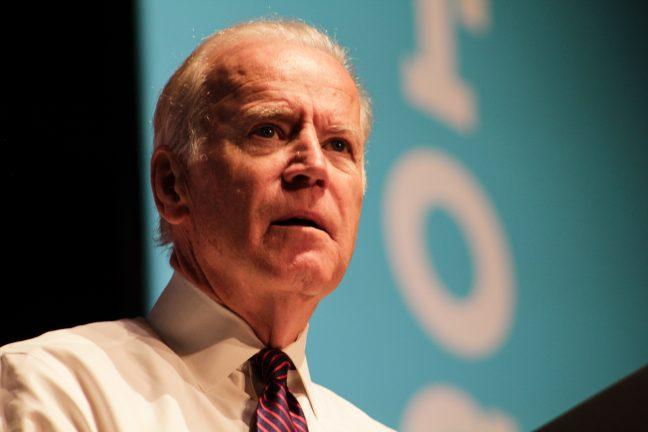With the Dow Jones falling nearly 778 points Monday — the largest single-day drop in U.S. history — and Wall Street staples like Bear Stearns and Lehman Brothers collapsing, Americans currently face what experts deem the gravest financial crisis since the Great Depression.
The country’s policies are rapidly changing as the government continues strengthening its hold over the market.
“The U.S. is sort of abandoning its capitalist principals,” said University of Wisconsin real estate professor Timothy Riddiough.
The Senate’s passage of their bailout plan by 74 to 25 late Wednesday night only furthers the belief that the country’s economic policy has been permanently changed.
While Sen. Russ Feingold, D-Wis., opposed the act, Sen. Herb Kohl, D-Wis., voted in favor of it, saying in a statement Wednesday night that “as we move forward, we must put stronger regulations and oversight in place so we avoid a similar crisis in the future.”
The future of the global economy now hinges on the U.S. House of Representatives, which is set to vote on the new bill either today or Friday, after a frustrating failure to pass the bailout plan Monday in the midst of plummeting world markets.
The housing boom… and bust
he wave of bankruptcy crashing on Wall Street traces back to a change in the housing mortgage market.
Changes began with the federal government’s attempt to limit the powers of major lenders Fannie Mae and Freddie Mac, according to Riddiough.
By curtailing the two major mortgage providers, Riddiough said the government opened the floodgates for more loan companies to enter the market.
The influx of mortgage companies led to increased competition and created a market for poor credit borrowers who “were previously shut out of the housing market,” Riddiough said.
As more people entered the market, the growing number of new buyers searching for low-cost housing drove up the cost of low-, middle- and then high-cost homes.
But the increase in home prices did not last forever. UW real estate professor Morris Davis explained before a panel Monday why blame for the current economic situation is being placed on the decline in house prices.
Between 1996 and 2006, house prices rose by 5 percent annually — a vast increase compared to the previous 20 years when housing costs went up by an average of less than 1 percent per year.
As homes were rapidly gaining value post-1996, financial institutions began to issue subprime loans — loans with a high interest rate given to people with little or no credit — to those looking to purchase a house.
“Heavily levered institutions gambled that house prices would not fall,” Morris said at the panel. “The gamble was we would buy mortgages that would pay a premium yield.”
But most subprime loans did not have a permanent interest rate. After two or three years at a low, fixed rate, many of these subprime loans became adjustable rate mortgages, loans with periodic interest rate changes.
According to Riddiough, the subprime loan market made sense for financial institutions when it was developed because institutions had no way of predicting the decline in home values after 2006.
Riddiough said subprime loans were meant to benefit financial institutions when fronting cash to both good and bad lenders.
Financial institutions, Riddiough added, anticipated good borrowers would refinance into a new mortgages when the adjustable rate period began and their rates increased, therefore continuing to pay off their loan over a long period of time.
He added bad borrowers, those who could neither pay their adjustable rate mortgage nor refinance, would have their homes repossessed.
Institutions expected to make money off these bad borrowers by anticipating the housing market would continue to skyrocket, making repossessed homes worth more than the amount lent out to purchase them a few years earlier.
“The premise was that the value of the house would hold up, and [financial institutions] could recover all or most of the loan amount,” Riddiough said. “What they didn’t anticipate was the significant declines in house prices which put the borrowers in a situation where they were underwater.”
When the housing bubble burst in mid-2006, many began defaulting on their subprime loans. Because of the decrease in housing prices, the homes facing foreclosure were worth less than when they were purchased.
“When house prices fall, there are many more defaults,” Morris said at the panel. “If we have a system that lets you walk away from your house, why would you continue to make mortgage payments on your house when the value of the house is worth less than the mortgage debt?”
The proceeding wave of foreclosures cost large financial institutions more money on top of the funds they lost through the actual default on the loan, Morris said.
“Defaults are costly because people don’t pay anything when they’re in the default and foreclosure process; essentially, they live rent-free,” he said.
Wisconsin’s stance on the budget
The government’s scramble to save the nation’s economy came to a head Monday when the $700 billion financial bailout bill failed by a vote of 225 to 208 in the House.
Wisconsin representatives crossed partisan lines, with Democrats and Republicans both voting for and against the plan.
Representatives in favor of the Emergency Economic Sustainability Act say the economic crisis demands a timely response to prevent the financial system from completely collapsing. The current economic situation, according to Rep. Tammy Baldwin, D-Wis., “is real and demands a response.”
But opponents sighted a lack of oversight and planning as reasons for voting against the bill.
Wisconsin Republican Rep. Tom Petri’s Press Secretary Niel Wright said the act was shoved at Congress, and Petri thought multiple options should be considered before deciding on a matter of such importance.
“The Treasury Department came in with their proposal and said it was terribly urgent and everything was going to fall to pieces unless everybody voted to deliver this $700 billion right now,” Wright said. “Let’s take a breath and see what people outside the Treasury Department think we ought to do.”
Baldwin, however, said there is no time to spare. Major banking institutions are failing, she said, adding, “lending has dried up in many areas.”
Conner Sweeney, press secretary for Rep. Paul Ryan, R-Wis., echoed Baldwin’s sentiments, saying Ryan voted in favor of the bill because fast decisions must be made to alleviate the nation’s credit crunch.
“Lines of credit are what make our economy work,” Sweeney said. “When access to credit is limited … that hits every American quite hard, and that’s the crux of this problem and this crisis.”
Those who voted down the bill feared the measure would end up costing taxpayers billions of dollars and would use funds from local businesses on “Main Street” to fund bigwigs on Wall Street.
“This legislation … will put an unbelievable amount of taxpayer money at risk and penalize those who used common sense during a time when others elected to ignore reason by making decisions that led them to live beyond their means,” Rep. James Sensenbrenner, R-Wis., said in a statement.
The lone Wisconsin Democrat to vote against the bill, Rep. Steve Kagen, said the bill would authorize the Bush administration to provide huge amounts of cash to financial institutions that failed to keep their finances in order.
The bill, he added, would not benefit Wisconsin families.
“We have seen so many people struggle just to keep their heads above water,” Kagen said in a statement. “This bill does not help them.”
This failed bill was not the first proposal set in front of Congress. Sweeney said Bush’s original proposal was wildly unpopular and “amounted to a blank check with … no oversight or transparency.”
The proposal was “ridiculous,” according to Baldwin, who said constituents “overwhelmingly said to reject the president’s bailout.”
But the newer version contained transparency clauses to protect taxpayers, Baldwin said.
“It was very workable and would provide a needed new tool to help prevent a collapse of major economic and banking industries,” Baldwin added.
The House is set to vote again on a bailout bill today or Friday.
Elctions and the Bailout Bill
With Election Day rapidly approaching, Monday night’s vote in the House has deep implications as those up for re-election do not want to be associated with the nation’s disastrous economic state.
Despite the president’s endorsement of the legislation, the bill was more unpopular with Republicans than Democrats. Sixty-five Republicans voted for the measure and 133 voted against it; 140 Democrats supported it and 95 opposed.
Public opinion voiced strong opposition to the bailout proposal, according to UW political science professor John Coleman.
The most vulnerable representatives, both Democrats and Republicans, voted against the measure in higher numbers than those who won their 2006 election by a large margin, Coleman said.
“With public opinion not only against the bill, but intensely so, those members in competitive seats were less likely to take the chance of voting in favor of an unpopular bill,” Coleman said in an e-mail to The Badger Herald.
About 39 percent of Democrats in hotly contested 2006 elections — receiving less than 55 percent of the vote — favored the bailout bill.
This number of supporters is low compared to Democrats who won their 2006 election with more than 70 percent of the vote — 61 percent of whom voted to pass the bill.
The majority of House Republicans voted against the bill and disapproval of the piece of legislation was highest among Republicans who won their seat in 2006 with less than 55 percent of the vote.
The high number of Republicans who voted against the bailout bill may have a significant impact on the upcoming presidential election.
The Bush administration’s proposal lacks support from House Republicans, putting the party in a difficult situation, according to UW political science professor Barry Burden.
“I think the Republican Party is in disarray. … There is no one in charge,” Burden said. “Bush is no longer viewed as the head of the party, [and] McCain is not viewed as the head of the party.”
Yet with numbers swirling around Capitol Hill the past couple weeks, the grandiose $700 billion figure has scared taxpayers and representatives, Republicans and Democrats.
Riddiough said the funds for the bailout bill could come from two places: Either the federal government can borrow money by issuing bonds or they can raise taxes.
But because it is an election year, Riddiough said nobody wants to “touch the t-word,” because raising taxes during an economic crunch would be a wildly unpopular policy.
“What would happen is … the government would borrow from the bond markets, and at some point in the future, that money is going to have to be paid back,” Riddiough added.
The bill would give the federal government money to purchase securities — diversified financial values lumped together — from failing financial institutions.
Currently, trade has severely decreased on Wall Street because trust between buyers and sellers has faltered since the collapse of major financial institutions.
The government would use the $700 billion to purchase securities from one company and sell them to another, acting as a trusted middleman in hopes of getting the market moving again, Riddiough said.
“The government can come in and stand between buyers and sellers and effectively make a market,” Riddiough said.
Significant changes in the workings of the U.S. market are currently underway, Riddiough added, and “in the future there is going to be a lot of regulation.”
“When you’re in trouble, you worry about survival, Riddiough said. “And we’re in trouble.”















